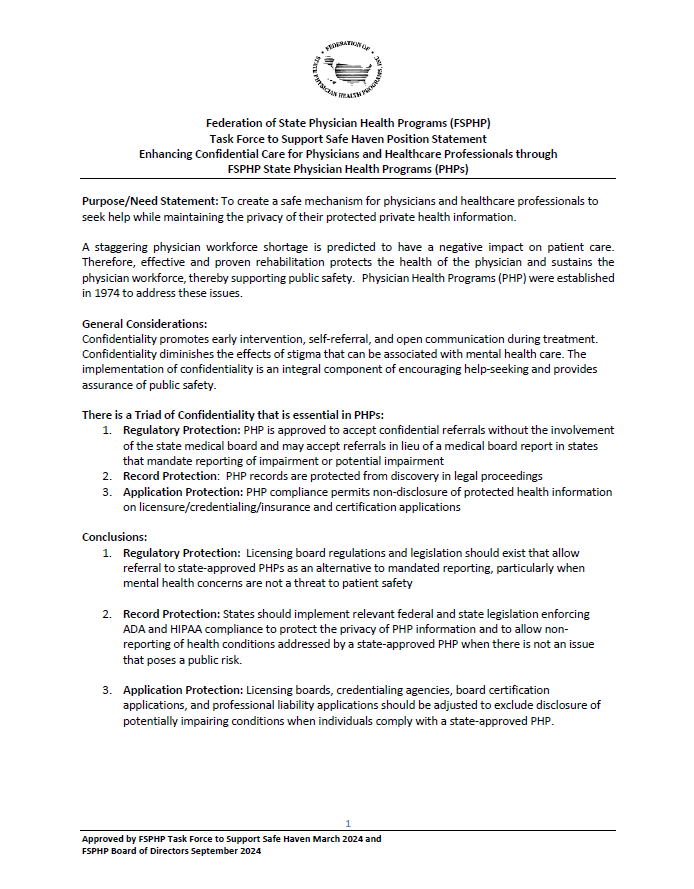FSPHP Performance Enhancement and Effectiveness Review™ (PEER™) Program Criteria and Metrics version 2.0


The FSPHP PEER™ Program was developed to empower PHPs and other health programs for workers in safety-sensitive occupational roles to use the new version of the FSPHP Performance Enhancement and Effectiveness Review™ (PEER™) Program Criteria and Metrics version 2.0 as a practical tool for identifying opportunities to optimize performance and effectiveness in alignment with best practices. These criteria and metrics were developed over the past 4 years to align with the 2019 FSPHP Physician Health Program Guidelines. These Guidelines were developed in collaboration with subject matter experts from Physician Health Programs, with objective oversight by the FSPHP Accreditation Review Council. The Council includes representatives from the American Medical Association, Accreditation Council of Graduate Medical Education, the Federation of State Medical Boards, the American College of Physicians, the American Osteopathic Association, the American Psychiatric Association, the American Board of Medical Specialties and the Medical Professional Liability Association.
Date of Adoption: March 2022, Published by the Federation of State Physician Health Program, copyright 2022 FSPHP.
Date of Last Revision: Version 2.0 December 2024
The price for a single organization license (to stay with the organization regardless of the individual purchasing it)
- $399.00 (FSPHP Members)
- $599.00 (Non-members)
Click Here to purchase this document via credit card. Upon receipt of payment a link to the document will be in your payment confirmation email.
FSPHP Evaluation and Treatment Accreditation™ (FSPHP-ETA™) Standards for Accreditation version 2.0


The FSPHP Evaluation and Treatment Accreditation™ (FSPHP-ETA™)
Standard for Accreditation of Evaluation and Treatment Services for Healthcare Workers in Safety-Sensitive Occupational Roles (FSPHP-ETA™ Standards) Version 2.0 were developed to recognize evaluation and treatment services that are qualified to specialize in the care of medical students, residents, career physicians, and other safety-sensitive professionals, through a valid, reliable, and rational assessment process that demonstrates compliance with objective standards. These were developed over a 4 year period to align with the 2019 FSPHP Guidelines with subject matter experts from Physician Health Programs, and Treatment Programs from around the US, and with objective oversight by the Accreditation Review Council (ARC) which includes representatives from the American Medical Association, Accreditation Council of Graduate Medical Education, the Federation of State Medical Boards, the American College of Physicians, the American Osteopathic Association, the American Psychiatric Association, the American Board of Medical Specialties and the Medical Professional Liability Association.
Date of Adoption: March 2022, Published by the Federation of State Physician Health Program, copyright 2024 FSPHP.
Date of Last Revision: version 2.0 December 2024
- The price for a single organization license (to stay with the organization regardless of the individual purchasing it) is $499.00
Click Here to purchase this document via credit card. Upon receipt of payment a link to the document will be in your payment confirmation email.
FSPHP Guidelines
1/18/21
These guidelines were developed by the FSPHP to help investigators interested in working with Physician Health Programs (PHPs) or with data generated by PHPs, in order to inform prospective investigators, standardize procedures, and facilitate research collaboration. The guidelines are meant to promote and facilitate research excellence in the field of physician health.
Click here to download the Research Guidelines
*Click here to submit a Research Proposal Planning Sheet to FSPHP.
*Please note: Non-Members will be asked to create a free profile in the FSPHP MemberClicks database in order to complete and submit this form.
2019 FSPHP Physician Health Program Guidelines
4/16/19
The Federation of State Physician Health Program Guidelines have been designed by FSPHP members with subject matter expertise to assist State Physician Health Programs (PHPs) with achieving accountability, consistency and excellence. An earlier version of these Guidelines was developed and accepted by the Federation of State Physician Health Programs (FSPHP) in 2005. The new 2019 FSPHP PHPs Guidelines expand upon the original Guidelines, reflecting developments in the science, practice, and scope of PHP services over the past decade. Many PHPs assist healthcare professionals in addition to physicians, such as dentists, nurses, veterinarians, and/or pharmacists. The use of the Guidelines for other professionals is left to the discretion of the individual PHP.
September 2024
The FSPHP Task Force to Support Safe Haven recognized the need to define safe haven terminology and establish standards for physician and healthcare professional programs to clearly understand its concept. The purpose of the position statement is to create a safe mechanism for physicians and healthcare professionals to seek help while safeguarding the privacy of their protected health information.
The action plan aims to address known confidentiality barriers that may prevent healthcare professionals from seeking necessary support, early intervention, or treatment from their state physician health programs when facing well-being challenges.
The following Triad of Confidentiality serves as the foundation that developed the proposed legislative and regulatory changes outlined in the action plan:
- Regulatory Protection: PHP is approved to accept confidential referrals without the involvement of the state medical board and may accept referrals in lieu of a medical board report in states that mandate reporting of impairment or potential impairment
- Record Protection: PHP records are protected from discovery in legal proceedings
- Application Protection: PHP compliance permits non-disclosure of protected health information on licensure/credentialing/insurance and certification applications









